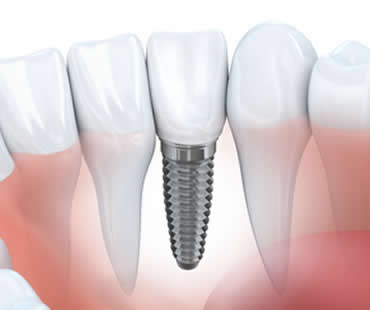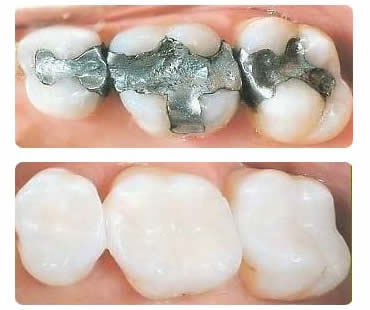
Dental implants are the best restorative choice for replacing a tooth that is missing. Whether the tooth has come out due to some kind of facial trauma or an infection or other issue, dental implants are the solution. The real difference in quality between a dental implant and other restorations such as bridges lies in the fact that the dental implant is placed directly into the patient’s jawbone, eventually fusing there through a process known as ossification.
Over time, ossification provides the kind of tooth base that is only seen elsewhere in natural teeth. When a dental implant is successful, it is as secure and as natural looking as a patient’s own original teeth; however, in some cases, dental implants fail. Sometimes they fail repeatedly. What’s causing these dental implant failures? Here are some potential causes.
Sometimes the implant doesn’t fuse with the bone and the bone shrinks away from the implant, leading to implant mobility or even the implant falling out. Patients who have weak bones due to age, osteoporosis, years of being edentulous (toothless) or another medical condition will find dental implants more challenging. If you’ve been having issues with failure to ossify, your dentist might recommend a bone graft to rebuild the jawbone to a healthy level so that dental implants can properly fuse.
In other cases, persistent infection may result in repeated implant failure. Signs of infection are continuous bleeding, swelling at the implant site or acute inflammation of the gum tissue at the implant site. Pus may be evident, or a bubble might appear on the gumline. Some health issues such as diabetes, auto-immune disorders or treatments like cancer therapies can weaken the immune system and leave the implant site vulnerable to infection. Your dentist might prescribe antibiotics or recommend you see an endodontist for a root canal treatment.
If you’re concerned about your dental implant, talk to Sicklerville dentist Dr. Drain right away. Find out what steps you need to take to ensure that your dental implants are successful.
Our dental office is located in Sicklerville

Babies obviously can’t take care of themselves, so parents have to handle all aspects of their care. Don’t forget their oral health! Parents need to lay the groundwork for lifelong good dental habits and healthy smiles for their children. Here are some answers to common questions about baby teeth.
Do baby teeth matter?
Primary, or baby, teeth are important. They help children chew naturally and speak clearly. They provide the place for adult teeth to grown in properly later.
Should I brush my baby’s teeth?
You should brush your baby’s teeth without toothpaste, using a small amount of water instead. Use a small, soft-bristled toothbrush at bedtime to remove plaque and bacteria from your baby’s teeth and gums.
When can I start using toothpaste?
Fluoride toothpaste can be implemented after age two, when a child can be trusted not to swallow the toothpaste. Only use a small amount of toothpaste, and watch the child carefully to ensure proper brushing and spitting out the toothpaste.
When should I take my child to the dentist?
Experts recommend taking your child to the dentist when their first tooth appears, or by their first birthday. Your child should be taken for dental visits every six months, or more often if your dentist has concerns.
Do I need a certain type of dentist for my child?
You may choose a pediatric dentist who has been trained specifically to treat children. Their goal is to teach children about oral hygiene and the importance of taking care of their teeth, as well as provide a comfortable experience in visiting the dentist. However, you may also choose a regular dentist to take care of your child’s oral health. It is up to you to decide which kind of dentist is right for your family.
If you need a dentist in Sicklerville contact us today

What you eat and drink can affect your oral health. A balanced diet will boost your body’s natural immune system, helping to lower your risks for oral problems. There are also certain foods and drinks that you should avoid in order to pave the way for healthy gums and strong teeth. Read on to learn how to ensure that your smile is safe and strong.
Cut down on snacks
Try to limit snacking between meals. The more often you eat, the more bacteria is stimulated and more acid is created. It is especially harmful to snack on sweet or starchy foods, which can harm your teeth and gums more quickly.
Limit sugar
Avoid foods and drinks that are high in sugar. It can stick to your teeth and if not removed promptly and thoroughly, can lead to tooth decay.
Watch what you drink
Drink plenty of water, and avoid sodas and fruit juices. Both of these can be sugary and acidic, which can harm your tooth enamel and cause decay.
Maintain a healthy diet
Try to eat a balanced diet consisting of the five major food groups. A well-balanced diet provides the vitamins, minerals, and other nutrients that your teeth and gums need. Fresh vegetables and fruits, and foods rich in calcium, are good choices for your oral health.
Practice good oral hygiene
Contact our Sicklerville dental office to learn about good dental hygiene techniques that will help you prevent tooth decay and gum disease. Brush your teeth at least twice a day, floss daily, and see your dentist for regular checkups.
Our dental office is located in Sicklerville

Many oral surgeries go beyond simply removing a tooth, and the cause is not always related to poor dental hygiene. Some reasons for oral surgery just can’t be predicted or avoided, such as injuries, birth defects, or cancer. Great strides have been made in oral surgery, especially for restoration and reconstruction techniques. These are some common reasons that oral surgery is advised.
Tooth loss
Replacing missing teeth with dental implants requires oral surgery so that the titanium implant can be inserted into the jaw. Providing an alternative to dentures and bridges, implants offer a secure and permanent solution that looks very natural. Candidates with adequate bone density, good overall health, and who practice proper oral hygiene are considered for implant surgery. After the implant heals, a crown will be placed on top to complete the restoration.
Impacted teeth
One of the most common oral surgeries is to remove impacted wisdom teeth. Often occurring during the late teen to early adult years, wisdom teeth are unable to erupt properly and must be extracted to prevent future problems.
TMJ
Temporomandibular joint disorders involve the joint where the skull and lower jaw come together in front of the ear. Facial pain, headaches, popping, and jaw problems can result, and dentists try to treat the disorder with solutions like splints, physical therapy, and medications. Severe cases can require surgery to fully correct the TMJ problems.
Injuries
Car accidents, sports injuries, and other trauma can cause broken facial bones or jaws. Surgery may be necessary to realign the jaws, wire bones together, and otherwise repair the injury so that normal function and comfort can be restored.
Cleft repairs
Birth defects like a cleft lip or palate are corrected through oral surgery. Usually a series of surgeries over a span of years is needed to improve the appearance and proper function of the areas affected by the birth defect.
Biopsy
Surgery is performed to remove cancerous tumors or lesions in the jaws or facial bones. This is especially true when the joints or connecting muscles and tendons are involved.

The changing seasons can prompt many people to want to change their appearance, perhaps through treating themselves to a brand-new smile. Your dentist in Sicklerville can provide a number of different cosmetic dentistry and restorative treatments to help provide a beautifully healthy and natural looking smile.
Cosmetic and Restorative Options
Modern dentistry techniques are extremely sophisticated and your dentist can do a lot to improve your smile. Possible options include porcelain veneers that cover the front surfaces of your teeth, crowns to restore teeth damaged by tooth decay or trauma, dental bonding that helps improve the shape of the tooth in just one easy visit, and enamel reshaping to correct minor issues such as slightly overlapping teeth. Dental implants can be used to replace missing teeth, transforming a gappy smile into something far more pleasing.
Teeth Whitening
Professional teeth whitening can quickly brighten up your smile, creating a youthful and healthy appearance. Your dentist in Sicklerville can offer you in-office whitening that will lift the shade of your teeth in just an hour. If you prefer, you can have custom made whitening trays to use at home. Your dentist will provide you with the correct strength of whitening gel to safely bleach your teeth.
Teeth Straightening
It’s never too late to straighten your teeth and adult orthodontics is increasingly popular. Ask your dentist about Invisalign clear braces that will discreetly straighten your smile without really affecting day-to-day activities.
Checkups and Professional Cleanings
Your first step should be to schedule an appointment for a checkup and professional cleaning. Your dentist will need to examine your mouth to make sure your teeth and gums are healthy before carrying out any cosmetic dentistry treatments. They’ll discuss the type of options that might help you, and can compile a treatment plan to improve your smile. A professional cleaning removes tartar buildup and gives your smile an added sparkle. It’s a great treatment for keeping teeth and gums healthy.
Schedule your appointment at our Sicklerville dental office

At one time, metal fillings were the only choice to repair tooth decay. Now, many dentists have switched to composite resin fillings, which match natural-tooth color so they don’t compromise the appearance of your smile. Tooth-colored fillings have gained popularity, and many dentists only offer this option. In recent years, there has been a strong push to eliminate amalgam fillings all together.
Amalgam fillings are made of several metals, with up to a 50 percent composition of mercury. It is widely known that mercury is toxic to the body. Some of the concern about amalgam fillings is the affect mercury has on the body, including:
• Causing damage to the kidneys
• Contributing to infertility
• Impacting the nervous system
• Interfering with the function of the thyroid and pituitary glands
• Posing unknown risk to a fetus
• Weakening the immune system
Because each person is different, you may have no reaction to the amalgam fillings. Over time, though, these restorations may change shape or crack, which can cause them to leak. If the fillings don’t hold up, the area may become susceptible to additional damage or decay.
At your checkup, have the dentist evaluate any old fillings to make sure they are still in good condition. You can also discuss the benefits of replacing amalgams with composite fillings. The newer restorations blend with your natural tooth coloring and require less removal of health tooth structure, which allows for a more conservative repair.
Our dental office is located in Sicklerville












